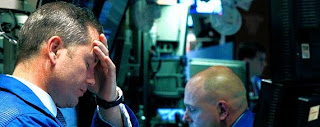Specialist traders on the New York Stock Exchange floor during the record intraday point decline. The Dow is back at its March 4 level
A bad day in the financial markets was made worse by an apparent trading glitch, leaving traders and investors nervous and scratching their heads over how a mistake could send the Dow Jones Industrial Average into a 1,000-point tailspin.
At its afternoon low, the Dow had plummeted 998.50 points, its biggest intraday point drop ever. The swing from its intraday high was 1,010.14 points.
The Dow eventually rebounded to close down 347.80 points, or 3.2%, at 10520.32, its worst percentage decline since April 2009. Stocks from Dow components Procter & Gamble and 3M suffered precipitous declines. At one point shares of P&G tumbled 37%.
The markets were already on edge before the midafternoon collapse as traders watched televised scenes of rioting in Athens following the Greek government's approval of its portion of the European Union and International Monetary Fund bailout. The euro had tumbled to a new 14-month low and credit markets were showing signs of strain in Europe and the U.S.
Throughout the day, markets around the globe posted big declines as investors reacted with disappointment to the failure of the European Central Bank to signal any heightened concern about the spiraling Greek
debt crisis.
Standard & Poor's 500-stock index dropped 3.2% to 1128.15 Bond, commodity and currency markets were all roiled as investors fled from risky assets toward the safety of gold and Treasurys.
The Chicago Board Options Exchange Volatility index, or VIX, which tracks volatility in stock-index options, at one point soared 60% to nearly 40 and ended the day up nearly 32%.
Asian markets immediately opened down Friday. Japan's Nikkei fell more than 4% and Australia's S&P/ASX 200 fell more than 3%.
After the gyrations, President Barack Obama was briefed by Treasury Secretary Timothy Geithner and National Economic Council Director Lawrence Summers on the situation in U.S. financial markets and the latest moves in Europe to cope with the debt crisis. An administration official said they discussed market structure and the government agencies looking into the crisis and its potential impact on the U.S. economy.

No comments:
Post a Comment